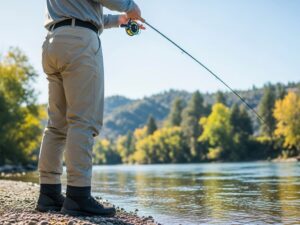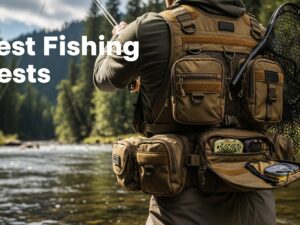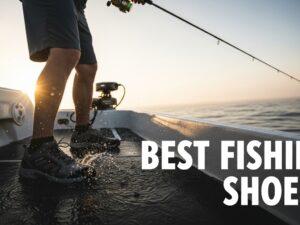Planning a family fishing trip but wondering about license requirements for your children? The answer depends on your state, as fishing license age requirements vary significantly across the United States. Most states allow young anglers to fish without a license until they reach ages 15 or 16, though specific regulations differ. This comprehensive guide covers everything parents need to know about youth fishing licenses, state-by-state requirements, and how to ensure your family fishing adventure stays legal and enjoyable.
Understanding these regulations before heading to the water saves you from potential fines and teaches children the importance of following conservation laws. Whether you're planning a weekend at the local pond or booking a vacation to explore Alaska's pristine fishing waters, knowing the licensing requirements for your young anglers is essential. Let's explore exactly when kids need fishing licenses and how to navigate the various state regulations.
Quick Answer: When Do Kids Need Fishing Licenses?
Most states do not require fishing licenses for children under 16 years old. However, this age threshold varies by state, with some allowing free fishing until age 15 or 17. Parents should verify their specific state's requirements before fishing, as regulations change annually and differ between freshwater and saltwater fishing.
Even when licenses aren't required, young anglers must still follow all other fishing regulations including size limits, bag limits, and seasonal restrictions. Some states require free youth permits or harvest cards for certain species like salmon or steelhead, regardless of age exemptions.
Understanding Fishing License Requirements for Kids by State
California Fishing License Age Requirements
In California, anyone 16 years or older must possess a valid sport fishing license when taking fish, shellfish, reptiles, or amphibians. This means children 15 and younger can fish without purchasing a license throughout the Golden State's diverse waterways.
However, young California anglers still need report cards for specific species. Youth under 16 must obtain free report cards when targeting steelhead, sturgeon, or spiny lobster. These cards help wildlife officials track harvest data for conservation purposes.
Parents should note that even when fishing from public piers where adults don't need licenses, children must still follow all size and bag limit regulations. The exemption only applies to the license itself, not other fishing rules.
Colorado Fishing License Age Requirements
Colorado offers one of the most generous youth fishing programs in the nation. Youth aged 15 and under can fish for free in all Colorado waters without any license requirements. This policy encourages families to enjoy the state's exceptional types of fishing opportunities together.
Starting at age 16, Colorado residents can purchase discounted youth licenses until they turn 18. These reduced-cost licenses make it affordable for teenage anglers to continue pursuing their passion while learning conservation principles.
The state also provides special youth fishing days and clinics throughout the year. These events offer young anglers opportunities to learn proper techniques, fish handling, and outdoor ethics from experienced instructors.
New York Youth Fishing Regulations
New York State exempts children 15 and younger from fishing license requirements. This applies to both residents and non-residents fishing in New York waters, making family vacations simpler for visiting anglers.
Once children turn 16, they must obtain appropriate licenses based on residency status. New York offers discounted licenses for residents aged 16-17, helping make the transition to licensed angling more affordable for young enthusiasts.
The state's lifetime license program allows parents to secure fishing privileges for children at significantly reduced rates. Purchasing lifetime licenses before age 5 costs just $380, providing decades of fishing opportunities.
Florida Kids Fishing Rules
Florida's approach balances conservation with youth engagement. Residents under 16 and non-residents under 16 can fish without licenses in both freshwater and saltwater. This uniform age requirement simplifies regulations for families fishing different water types.
Young anglers participating in youth fishing events may need special event licenses depending on the program. Many Florida fishing camps and educational programs include these permits in their registration fees.
When fishing from Miami's popular fishing piers, children enjoy the same license exemptions as when fishing from shore or boats. However, they must still follow species-specific regulations and bag limits.
Texas Youth Angler Exemptions
Texas provides license exemptions for youth under 17 years old in most situations. This higher age threshold gives teenage anglers an extra year of free fishing compared to many other states.
Special provisions exist for disabled youth and those participating in state-approved educational programs. These exemptions may extend beyond the standard age limit with proper documentation from qualified organizations.
The state's youth hunting and fishing programs offer mentored opportunities where experienced adults teach conservation ethics alongside fishing skills. These programs help prepare young anglers for responsible license ownership.
Age Limit for Fishing License: Special Exemptions and Programs
Free Fishing Days for All Ages
Most states designate specific weekends as free fishing days when anyone can fish without licenses regardless of age. These events typically occur during National Fishing and Boating Week in early June, though dates vary by state.
Free fishing days provide perfect opportunities for families to try fishing before investing in licenses and equipment. All other regulations including size limits, bag limits, and gear restrictions still apply during these events.
Many states coordinate youth fishing derbies and educational programs with free fishing weekends. These events often include loaner equipment, casting lessons, and prizes specifically for young anglers.
Youth Mentored Fishing Programs
Several states offer special mentored youth permits allowing children to fish during designated seasons before regular opening days. Pennsylvania's Mentored Youth Trout Day exemplifies this approach, letting properly supervised youth catch trout early.
These programs typically require adult mentors to possess valid licenses while closely supervising young anglers. Mentors cannot fish themselves during youth-only periods but can provide hands-on instruction and assistance.
Participation in mentored programs helps children develop skills and confidence before fishing independently. Many young anglers credit these early positive experiences with fostering lifelong outdoor interests.
Reduced-Cost Youth Licenses
States recognizing that 16 and 17-year-olds often have limited incomes offer significantly discounted youth licenses. Colorado charges just $10.23 for youth licenses compared to over $35 for adult residents.
Some states extend reduced pricing to college students under age 24 with valid student identification. These programs acknowledge that young adults in school may struggle to afford full-price licenses while pursuing education.
Military families stationed in different states often qualify for resident youth pricing regardless of home state. This benefit helps service members' children maintain fishing opportunities despite frequent relocations.
Age for Permanent Fishing License Options
Lifetime License Programs by Age
Many states offer lifetime fishing licenses with age-based pricing structures. The younger the child when purchasing, the lower the cost for decades of fishing privileges. New York's pricing exemplifies this approach:
- Ages 0-4: $380
- Ages 5-11: $535
- Ages 12-69: $633
These one-time purchases eliminate annual renewal hassles while supporting long-term conservation funding. Parents often purchase lifetime licenses as meaningful gifts for birthdays or holidays.
Some states restrict lifetime license sales to residents only, while others allow non-residents to purchase at higher rates. Buyers should verify residency requirements and whether licenses transfer if moving states.
Best Age to Buy Lifetime Licenses
Financial analysis suggests purchasing lifetime licenses before age 5 provides maximum value. The lower initial cost combined with decades of use creates substantial savings compared to annual licenses.
Parents should consider their family's commitment to fishing before investing in lifetime licenses. Children who show genuine interest in fishing by age 3-4 will likely benefit most from early lifetime license purchases.
States occasionally offer promotional pricing on lifetime licenses during special events. Watching for these sales can reduce costs further while securing long-term fishing privileges for children.
Multi-State License Considerations
Families who fish in multiple states should research reciprocal agreements and multi-state license options. Some border states honor neighboring licenses in specific waters, reducing the need for multiple purchases.
The Atlantic States Marine Fisheries Commission coordinates saltwater registry requirements among coastal states. Understanding these interstate agreements helps families plan multi-state fishing adventures efficiently.
Consider purchasing non-resident youth licenses in frequently visited states rather than day passes. Annual non-resident youth licenses often cost less than several short-term permits for active fishing families.
How to Get a Youth Fishing License?
Online Purchase Options
Most states now offer convenient online license purchasing through official wildlife agency websites. Parents can buy youth licenses using credit cards, with immediate electronic delivery in many cases.
Online systems typically require creating accounts with basic information including birthdates and addresses. Some states verify residency through driver's license numbers or other documentation during registration.
Electronic licenses displayed on smartphones satisfy legal requirements in increasing numbers of states. However, printing paper copies remains wise for areas with poor cell service or strict enforcement.
Retail License Vendors
Sporting goods stores, bait shops, and even some grocery stores sell fishing licenses as authorized agents. These vendors offer personal assistance for families unfamiliar with license requirements or regulations.
Purchasing from local shops supports community businesses while gaining valuable local fishing knowledge. Staff members often share information about nearby fishing spots suitable for different boat types and youth-friendly locations.
Some vendors charge small processing fees above state license costs. Comparing prices between vendors or buying directly from state agencies can save money on multiple licenses.
Required Documentation for Youth Licenses
Parents must provide proof of their child's age when purchasing youth licenses or claiming age exemptions. Acceptable documents typically include:
- Birth certificates
- Passports
- State-issued ID cards
- School enrollment records
Residency verification may require additional documentation such as utility bills or rental agreements showing state addresses. Military families often need orders or base housing assignments as proof.
Keep copies of youth licenses and age verification documents while fishing. Conservation officers may request proof of age exemptions, especially for older teenagers who appear adult-sized.
Teaching Kids Responsible Fishing Practices
Conservation Education Through Licensing
Fishing licenses fund critical conservation programs protecting aquatic resources for future generations. Teaching children about license fees supporting fish stocking, habitat improvement, and research builds conservation awareness early.
Many states offer youth conservation education programs combining fishing instruction with environmental stewardship. These programs often include free or reduced-cost licenses as incentives for completion.
Parents can use license purchases as teaching moments about following rules and contributing to resource management. Children who understand why licenses matter often become more responsible anglers.
Following Regulations Together
Even when licenses aren't required, young anglers must follow all other fishing regulations. Parents should review current rules with children before each trip, emphasizing size limits, bag limits, and protected species.
Using regulation guidebooks or smartphone apps together helps children learn to find information independently. This skill becomes essential when they begin fishing without constant adult supervision.
Consider creating family fishing logs recording catches, locations, and regulation compliance. These records teach documentation habits while creating lasting memories of shared outdoor experiences.
Leading by Example
Children learn more from observing adult behavior than from verbal instructions alone. Parents who consistently follow regulations, practice catch-and-release when appropriate, and respect the environment model responsible angling.
Properly disposing of fishing line, picking up litter, and treating fish humanely demonstrates conservation ethics in action. Young anglers who see these behaviors regularly internalize them as normal fishing practices.
Purchasing licenses promptly when children reach required ages shows respect for regulations. Making this transition celebratory rather than burdensome helps young anglers view licenses positively.
Common Mistakes Parents Make
Assuming All States Have Identical Rules
One major error involves assuming fishing license age requirements remain consistent across state borders. Families fishing during vacations or near state boundaries must research each state's specific regulations carefully.
This mistake commonly occurs when grandparents take grandchildren fishing in different states. What's legal in the home state might require licenses elsewhere, leading to unintentional violations and potential citations.
Online resources and smartphone apps help track different state requirements. Bookmarking official state wildlife agency websites provides quick access to current regulations wherever families fish.
Forgetting About Saltwater Differences
Many states have separate licensing requirements for freshwater and saltwater fishing. Parents familiar with freshwater exemptions might wrongly assume identical rules apply in coastal areas.
Some states require saltwater registrations even when licenses aren't needed. These free registrations help federal agencies track marine fishing participation for management decisions.
Checking both freshwater and saltwater requirements prevents surprises during beach vacations or coastal fishing trips. Many coastal states offer combination licenses covering both water types efficiently.
Not Checking Annual Regulation Changes
Fishing regulations change annually as agencies adjust rules based on fish population assessments. License age requirements occasionally shift, making last year's information potentially outdated.
States typically publish new regulations before spring fishing seasons begin. Downloading current regulation guides ensures families have accurate information for the upcoming northern pike season or other target species.
Setting calendar reminders to check regulation updates helps busy parents stay informed. Many state agencies offer email notifications about significant regulation changes affecting youth anglers.
State-by-State Youth Fishing License Quick Reference
| State | License Required Age | Special Youth Programs |
|---|---|---|
| Alabama | 16 and older | Youth hunting/fishing license combo available |
| Alaska | Residents 18+, Non-residents 16+ | Free for residents under 18 |
| Arizona | 10 and older | Youth combo licenses available |
| Arkansas | 16 and older | Reduced cost ages 16-17 |
| California | 16 and older | Free youth report cards required |
| Colorado | 16 and older | Free fishing 15 and under |
| Connecticut | 16 and older | Youth licenses at reduced cost |
| Delaware | 16 and older | Free youth fishing tournaments |
| Florida | 16 and older | Youth conservation programs |
| Georgia | 16 and older | Honorary youth licenses available |
Note: Regulations change annually. Always verify current requirements with official state wildlife agencies.
Frequently Asked Questions
At what age do most states require fishing licenses?
Most states require fishing licenses starting at age 16. However, requirements range from age 10 in states like Arizona to age 18 for Alaska residents. Always check specific state regulations before fishing.
Can adults fish without a license if only helping kids?
Generally, adults need valid licenses even when primarily helping children fish. Actively handling rods, casting, or landing fish requires licenses regardless of who catches them.
Do kids need licenses for catch-and-release fishing?
License requirements apply equally to catch-and-release and harvest fishing. The act of attempting to catch fish triggers licensing requirements, not whether fish are kept.
Are there different rules for private ponds?
Many states exempt fishing in private ponds from license requirements regardless of age. However, this typically applies only to ponds entirely contained within single properties without connections to public waters.
What happens if caught fishing without required licenses?
Penalties for fishing without licenses vary by state but often include fines ranging from $50 to several hundred dollars. Multiple violations can result in loss of future fishing privileges.
Do disabled youth get special license considerations?
Many states offer free or reduced-cost licenses for youth with documented disabilities. These programs often extend age exemptions or provide lifetime licenses at no cost with proper medical documentation.
Start Your Family Fishing Adventure Today
Understanding fishing license requirements for kids opens doors to countless family memories on the water. While most states allow youth to fish freely until their mid-teens, knowing your specific state's regulations ensures legal, worry-free adventures. Remember that licenses fund vital conservation efforts protecting fisheries for future generations of anglers.
Take time to research your state's youth fishing programs, free fishing days, and educational opportunities. These resources help young anglers develop skills while learning conservation ethics that last lifetimes. Consider purchasing lifetime licenses for committed young anglers to secure decades of fishing opportunities at bargain prices.
Ready to plan your next family fishing trip? Check your state's current youth fishing regulations, mark free fishing days on your calendar, and explore local waters where children can discover the joys of fishing. Visit your state wildlife agency's website today to ensure you have all the information needed for legal, enjoyable family fishing adventures throughout 2025.



